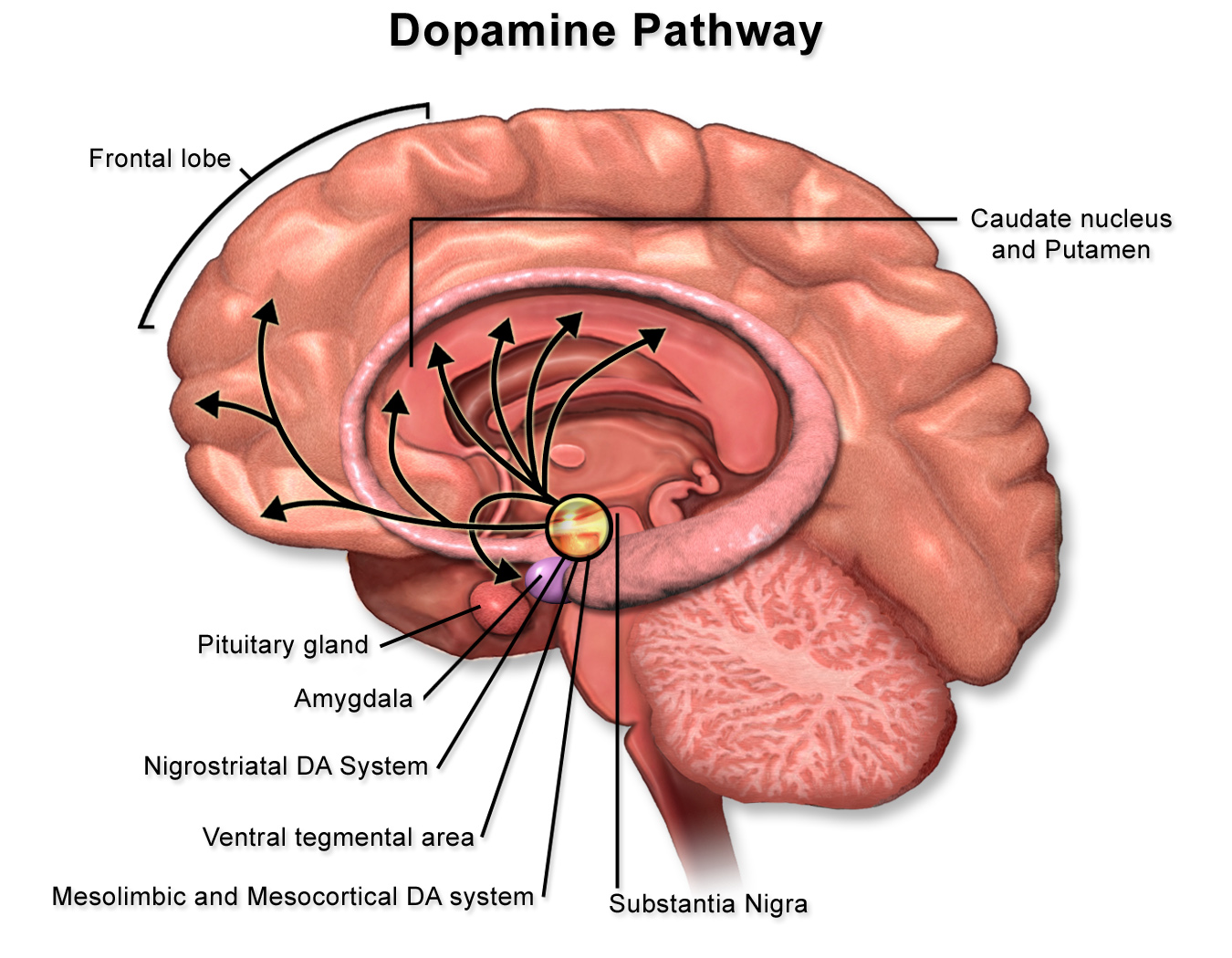Dopamine is a type of neurotransmitter or chemical messenger that is produced in several areas of the brain, including the substantia nigra and the hypothalamus. It plays an integral role in several key brain functions, such as reward, motivation, memory, attention, and regulation of body movements. Its chemical structure is C8H11NO2.
Here are some important aspects related to dopamine:
1. Role in the reward system: Dopamine is often called the "feel-good" or "pleasure" neurotransmitter, as it is responsible for the pleasurable sensations associated with experiences like eating, drinking, sex, and social interactions. When we engage in these activities and feel pleasure, our brain releases dopamine, reinforcing the desire for repeating these experiences.
2. Important in motivation: Dopamine also plays a crucial role in motivating us to engage in goal-directed behaviors, seek rewards, and avoid punishment. It helps in guiding our efforts and persistence in achieving our goals.
3. Cognitive function and learning: Dopamine facilitates learning and memory by modulating and supporting neuronal plasticity, as well as signaling the importance of environmental cues for reward prediction.
4. Regulation of motor control: Within the basal ganglia, dopamine facilitates the initiation of voluntary movements and helps to coordinate smooth and purposeful actions. Imbalances in dopamine levels can cause issues in motor control, leading to diseases like Parkinson's, in which dopamine-producing neurons degenerate, making it difficult for individuals to control their movements.
5. Addiction and dopamine: Substance abuse, addiction, and even behaviors like gambling involve the dopamine system, as these activities release excess dopamine, causing intense feelings of pleasure and reinforcement.
6. Dopaminergic pathways: There are several important dopaminergic pathways in the brain, including the mesolimbic, mesocortical, nigrostriatal, and tuberoinfundibular pathways. These pathways are associated with reward and motivation, cognitive function, motor control, and hormonal regulation, respectively.
7. Imbalances and disorders: Imbalances in dopamine levels may lead to various mental health disorders and neurological conditions like depression, ADHD, schizophrenia, bipolar disorder, and Parkinson's disease. Treatments often include medications that help regulate and stabilize dopamine levels in the brain.
While dopamine is essential for healthy brain function, an imbalance or dysfunction in dopamine levels can lead to various problems and diseases. Some of these include:
1. Parkinson's Disease: This is a progressive neurological disorder that occurs due to the loss of dopamine-producing neurons in the brain. The reduced dopamine levels result in symptoms such as tremors, muscle rigidity, bradykinesia (slowed movements), and postural instability.
2. Schizophrenia: Abnormal dopamine function is thought to be a significant factor in the development of schizophrenia, a severe mental disorder characterized by hallucinations, delusions, and disorganized thinking. While the exact relationship between dopamine and schizophrenia is still not fully understood, it is believed that increased dopamine activity in certain areas of the brain contributes to the positive symptoms of the disorder.
3. Attention Deficit Hyperactivity Disorder (ADHD): Imbalanced dopamine levels have been linked to ADHD, a neurodevelopmental disorder that affects both children and adults. Individuals with ADHD often have problems with attention, impulse control, and hyperactivity. Although the precise role of dopamine in ADHD is still being studied, medications that increase dopamine levels, such as stimulants, have been found to be effective in treating the symptoms of the disorder.
4. Addiction: Dopamine is heavily involved in the brain's reward system, and the release of dopamine is associated with feelings of pleasure and reinforcement. This can lead to issues with substance abuse and addiction, as drugs and other addictive behaviors often hijack the brain's reward system, leading to increased dopamine release and reinforcing the addictive cycle.
5. Bipolar Disorder: This is a mood disorder characterized by episodes of extreme emotional highs (mania) and lows (depression). While the exact causes of bipolar disorder are not fully understood, imbalances in various neurotransmitters, including dopamine, are believed to play a role in the development and progression of the disorder. Patients with bipolar disorder may have dysfunction in dopamine transmission, contributing to the mood fluctuations they experience.
6. Restless Legs Syndrome (RLS): This is a neurological disorder characterized by an irresistible urge to move the legs, often accompanied by unpleasant sensations. While the exact cause of RLS is unknown, research suggests that insufficient dopamine levels or poor dopamine function in the brain may contribute to the development of the disorder.
Overall, dopamine plays a vital role in various aspects of brain function, and imbalances or dysfunction in dopamine levels can lead to a range of problems and diseases. Understanding the role of dopamine in these disorders can help guide treatment and improve the quality of life for those affected
In summary, dopamine is a crucial neurotransmitter that plays a significant role in various aspects of our brain functions, including reward, motivation, cognitive functions, and motor control. Dopamine imbalances may contribute to several mental and neurological disorders, requiring therapeutic interventions to restore balance, and proper functioning.



